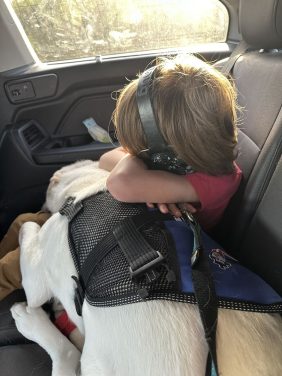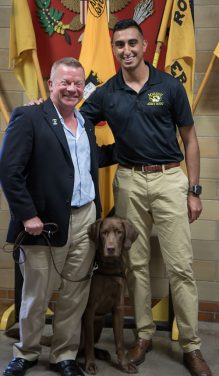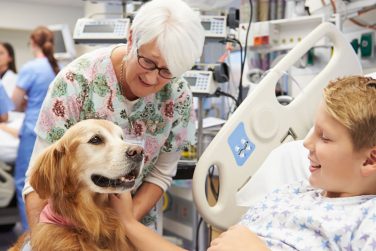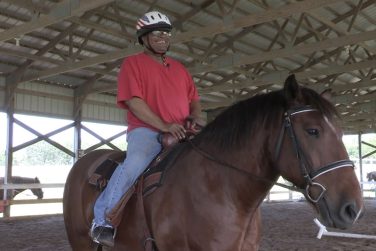Current Research

Impact of Service Dogs on the Well-being of Autistic Children, their Parents and Families
One in 44 children are diagnosed with Autism Spectrum Disorder. Autistic children have been found to benefit from interaction with dogs, yet minimal research has been found demonstrating the outcome of matching service dogs with autistic children. The aim of the project is to evaluate the impact of service dogs on autistic children, their parents and families. In this study parents of autistic children will complete surveys measuring the following: child symptoms of autism, child and parent anxiety, family functioning and dog attachment. Families will be followed over time from their initial approval to be on a waitlist to receive a service dog, through training and up to one year after being matched with a service. Findings will be helpful for families considering a service dog, service dog training organizations and scientists studying human-animal interaction.
Funded by the Human Animal Bond Research Institute (HABRI)
Previous Research

Shelter Cat Adoption in Families of Children with Autism: Impact on Children’s Social Skills and Anxiety as well as Cat Stress
Many families in the United States live with cats as companion animals, including families of children with Autism Spectrum Disorder (ASD). One in 44 children are diagnosed with ASD. Symptoms of ASD include a lack of social skills and anxiety. Companion animals have been helpful for children with ASD. However, there is little research on children with autism living with cats and no one has studied stress of cats living in these families. In this study 64 pre-screened shelter cats are being adopted in prescreened homes. Cats ages 10 months to four years that have been selected for calm behavior using a temperament, test are adopted by families in the study. We are examining the social skills and anxiety of the children with ASD, and bonding of the parents and children with their cats. We are also studying stress levels in the cats.
Funded by EveryCat Health Foundation and Human Animal Bond Research Institute (HABRI).

Exploring Human-Companion Animal Interaction in Families of Children with Autism
The diagnosis of Autism Spectrum Disorder (ASD) occurs in one in 59 children. Companion animals are common in families with children with ASD, with dogs and cats identified most commonly. Parents of children with ASD acquiring a dog have been found to have less stress. Children with ASD living with a CA in the home have been found to have increased prosocial behaviors. Trained dogs, like those used in animal assisted therapy and service dogs, have also been associated with the children’s’ increased social skills and decreased anxiety; however, it is unknown what CAs, other than dogs, may provide benefits. This study seeks to find out more about CA in families of autistic children. This information will help to inform the children’s caregivers if they are seeking to add a CA to their family. As with any pet adoption, it is vital that a sound match be identified between CAs and families. Given the excessive numbers of abandoned pets, homes of an autistic child may provide a beneficial outlet for pets from shelters. This study will use an online survey design through a well-established, national online network of individuals with ASD and their families. We will identify the the roles of CAs in these families, and how pet ownership is beneficial or problematic.
Funded by Nestlé Purina.

Uniting Veterans with Service Dogs
Study of the experience of MU students (ROTC cadets) conducting advanced training of dogs to be placed with veterans having PTSD. All dogs receive basic training in the Missouri Department of Corrections Puppies for Parole program and are selected for advanced training based on their performance at the completion of this basic training.
Funded by Lil’ Red Foundation.

Puppies for Parole: Shelter dog training and prison inmate behavior outcomes.
Statewide program implemented by the Missouri Department of Corrections in which more than 1,700 dogs have been trained and adopted. ReCHAI partners with four correctional facilities to measure outcomes in the prison offenders (self-esteem, locus of control) and staff (job satisfaction). The project studies the effects of offenders working with shelter dogs teaching them basic obedience skills and properly socializing the animals, making them more adoptable. Once the dogs have successfully completed the program they will be sent back to their original shelter to be placed up for adoption.

Human-Animal Interaction for People in Transition (HAIPT)
Human-Animal Interaction for People in Transition (HAIPT) is a multi-phased project developed in collaboration with the Missouri Statewide HAI Task Force. HAIPT’s mission is to facilitate successful transitions for individuals to healthy, fulfilling lives through support and enrichment of existing Missouri HAI programs. In Phase One of the HAIPT project, 108 human-animal interaction programs were identified across the state of Missouri, which serve a range of populations in many capacities.
The HAIPT pilot study takes the field of animal visitation to a new level by collaborating with volunteer human-animal interaction organizations to collect outcome data from patients. The overall goal is to have animal visitation programs be widely accepted as beneficial in health care settings for human patients.

Equine Assisted Activites for Veterans
Equine Assisted Activities for Veterans explores the effects of equine assisted activities on PTSD symptoms, emotional regulation, and social engagement in military veterans. The veterans participate in a therapeutic horseback riding program for six weeks. ReCHAI partners with three PATH (Professional Association of Therapeutic Horsemanship) certified riding sites.

Dogs & Autism Spectrum for Kids (DASK): Exploring Potential Benefits of Animal Interaction for Families of Children with Autism
The overall goals of this study were twofold: 1) to build an interdisciplinary network of collaborators in the areas of autism research and human-animal interaction; and 2) to collect data to investigate the potential benefits of human-animal interactions among children and families with ASD. This preliminary study provided the foundation for seeking future funding for an interdisciplinary research project with the long-term goal of enhancing treatment effectiveness for children with ASD.

Walk a Hound, Lose a Pound
This community shelter dog walking study provides adults and families with children an innovative way to increase physical activity. It is an ongoing partnership with the Central Missouri Human Society, the MO Department of Health & Senior Services, and the City of Columbia Parks and Recreation Department. The study consists of weekly (Saturday morning) walks with shelter dogs on a nearby nature trail. Participants are also educated about nutrition and the health benefits of walking. We measure body weight and physical activity levels outside of the program. Our findings show that by taking the dog walks, participants are motivated to further increase their physical activity. The study also increases community awareness about dogs available for adoption. In addition, the dogs become more adoptable through better socialization, more exercise, and leash-walking.

Ask the community: Barriers & facilitators of physical activity and exercise
A one-year assessment project to identify beliefs and attitudes about physical activity (PA) & exercise and key factors that will facilitate participation in physical activity & exercise programs among vulnerable, socioeconomically disadvantaged adults. It will also identify the major barriers to PA and exercise in this population. An assessment of PA & exercise programs available in Boone County will occur in Phase 1. In Phase 2, focus groups and self-completion questionnaires will be used with 100 adults in community settings (public housing facilities, churches, community centers & businesses) to address the assessment project aims. Assessment findings will be used to develop and implement a community-based PA and exercise program.

Walking for Healthy Hearts
This study tested health effects of coupling certified dogs and a handler with public housing residents in a walking program of two different lengths.
The study found that weight loss in a 50-week group surpassed that of national weight loss programs. Participants believed that dogs loved them unconditionally, and made walking pleasant. Additionally, the protocal was found to be inexpensive and minimally burdensome to participants.